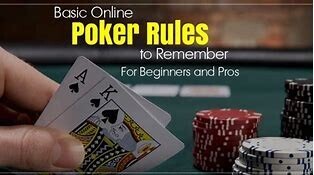Online poker’s a blast, but it’s got its own set of unwritten rules that are crucial for newbies. Etiquette’s not just about being polite—it’s key to keeping the game smooth and enjoyable for everyone. Imagine being at a dinner party; you’d want to make sure everyone has a good time, right? Same deal here, just with cards and chips.
Jumping into a game, keep in mind the big three: respect, patience, and politeness. Respect your fellow players, even when they’re crushing you with a killer hand. Patience is vital because not everyone plays at lightning speed, and politeness, well, that’s just the social lubricant that keeps conversations flowing and games friendly.
Keeping your cool when it’s all going down is an underrated skill. It’s easy to get caught up in the heat of the moment, but maintaining a calm and composed demeanor can actually enhance your play. It helps you make better decisions, plus nobody wants to be that hot-headed player everyone else mutters about. By understanding the basics of online poker etiquette, you’re setting a solid foundation for yourself, adding more enjoyment to the game, and making some great poker pals along the way.

Digital Respect: Chat Commandments for Newbies
The chat box—it’s like the watercooler of online poker. A virtual space to banter, cheer, and sometimes tilt. When you’re just starting out, knowing how to navigate these digital waters is a game-changer.
Good chatting boils down to simple manners. Sure, typing feels less personal than face-to-face, but the basic rules of respect still apply. Keep the chat friendly, avoid the urge to lash out when a hand goes south, and remember: Caps lock is yelling—nobody likes a keyboard shouter.
Sometimes, you’ll bump into a player who’s not on their best behavior. If things get messy, mute buttons and report functions are your best friends. These tools help keep your poker experience breezy and drama-free, leaving you to focus on the cards.
Being a newbie, spreading positive vibes in the chat can also earn you some brownie points. Congratulate good plays, encourage new players, and if the situation calls for it, a bit of humor never hurts. It’s all about promoting that friendly poker culture.
Respect and responsibility go a long way in the online poker world. By following these chat commandments, you’ll help create an enjoyable atmosphere that lets everyone have fun and play their best games.
Timeliness and Turn-Taking: The Importance of Speed
In the world of online poker, time is of the essence, especially when players on the virtual felt are zipping through decisions at lightning speed. Slow play isn’t just a minor nuisance; it can throw off the game’s rhythm and test the patience of everyone at the table. It’s important to keep things moving so everyone’s experience stays smooth and enjoyable.
Quick decision-making is a handy skill. By practicing and getting comfortable with the flow of the game, you can make your moves more instinctive. This doesn’t mean you have to rush blindly, but finding that balance between thoughtful play and reasonable pace is key.
A little help from technology goes a long way, too. Options like ‘Auto-Fold’ or ‘Check/Fold’ come in handy when you’re away from the action and want to avoid keeping others waiting. These features ensure the game doesn’t halt when you’re dwelling on whether to call or fold your hand.
Ultimately, keeping the game quick and efficient shows respect for your fellow players and the game itself. It makes for a more engaging, dynamic poker game for everyone involved. So the next time you’re at the table, keep in mind the pace of play—your poker peers will thank you.
Handling Wins and Losses: The Role of Sportsmanship
Whether you rake in the chips or find yourself down and out, how you handle the aftermath speaks volumes in online poker. At its heart, poker’s a game of chance mixed with skill, and embracing both winning and losing with grace is vital.
When the cards fall in your favor, it’s tempting to throw a virtual parade. Sure, it’s okay to celebrate a big win, but nobody likes a bragger. Winning humbly keeps the atmosphere friendly and celebrates the game itself more than an individual’s victory.
Taking a loss? It’s all part of the poker roller coaster. Bad beats happen, and while it’s easy to vent your frustration online, a bit of restraint goes a long way. Think of it as essential practice for real-world interactions; handling losses with dignity not only earns respect but also keeps you in a positive mindset for the next game.
A positive vibe influences the whole poker room. Playing with a healthy competitive spirit while maintaining good sportsmanship lightens the mood and makes the game more enjoyable. Remember, in poker, creating a fun and respectful environment is every bit as crucial as the cards you hold.
Safety and Security: Protecting Your Online Poker Identity
Staying safe online is more than just about keeping your chips; it’s about safeguarding your entire playing experience. Balancing fun and caution helps protect your personal and financial info when you hit the virtual tables.
Start by keeping your account details under wraps. Don’t share passwords or use easy-to-guess ones. Seems basic, but it’s your first line of defense. Use strong, unique passwords to add an extra layer of security.
Watch out for scams and phishing attempts. Fraudulent sites mimic real poker platforms to trick you. Stick to trusted poker rooms with good reputations and authentic reviews. Doing a bit of homework before joining a site can save you from a lot of headaches later on.
Consider using two-factor authentication when it’s available. It adds another defense against unauthorized access, ensuring your account stays yours and yours alone.
By locking down your online poker identity, you’re not just protecting your money and data but also ensuring a better, stress-free playing environment. With safety under control, you can focus on what matters—playing your best game.

Absolutely loved your insights on online poker etiquette, Christine! I previously commented on your post about “Understanding Tilt And How To Overcome It,” and once again, you’ve delivered valuable guidance.
The section on “Handling Wins and Losses: The Role of Sportsmanship” truly resonated with me. It’s a crucial reminder that maintaining grace, whether in victory or defeat, not only reflects personal character but also fosters a respectful and enjoyable gaming environment for all players.
Your emphasis on humility in wins and composure in losses is spot-on and essential for anyone serious about improving their game and contributing positively to the poker community.
Thank you for consistently providing such thoughtful and practical advice. Looking forward to your future posts!
Thank you so much for reading again! I am glad that you found the posts useful. I think humility in winning is very important, both online and in person. Anyone who has played poker consistently has seen a player celebrate a little too much when they win the hand. Everyone in the room turns to look at them, and not in a good way. That doesn’t do anything except make the loser of the hand feel worse than they already do, and make the person celebrate look like they have never won before. Humility goes a long way. Thanks for commenting, and I can’t wait for our future discussions.
Online poker definitely has its own set of unspoken rules, and it’s easy for newcomers to unintentionally make missteps. I’m curious, what’s your take on players using chat to tilt opponents or give unsolicited advice mid-game? Is that considered poor etiquette even if it’s not technically against the rules? Also, do you think certain platforms do a better job of fostering respectful play than others? I’ve noticed the vibe can vary a lot depending on the room or tournament style.
Thanks for reading. I definitely think the chat can be used in inappropriate ways. Many sites have the ability to turn chat off, and most sites, if not all, do not allow chat in tournaments. unsolicited advice could definitely be against the rules and is usually always going to be considered poor etiquette. Using chat to tilt opponents is almost the same as talking at a live table to do the same thing. The only difference is with chat no one is monitoring what is said. A dealer at a live game can moderate and make sure the taunter isn’t getting out of hand, whereas in a chat you are free to say whatever you want. You might get banned after the fact, but that doesn’t stop some people from doing it.